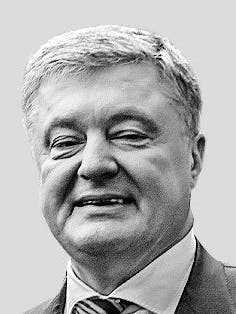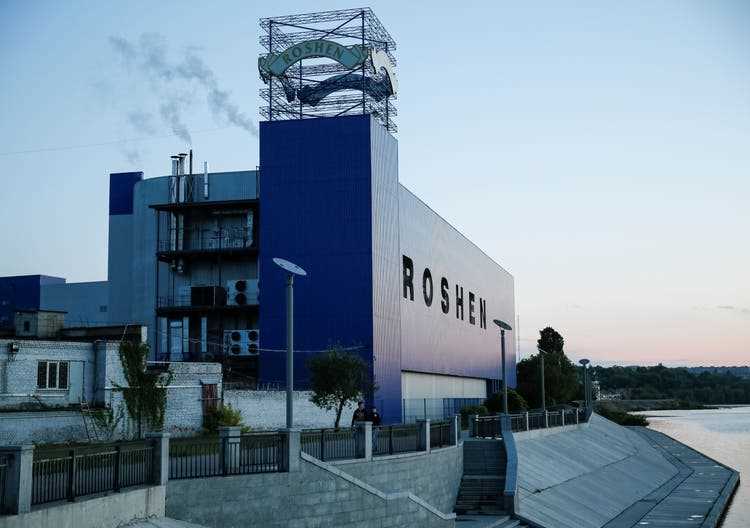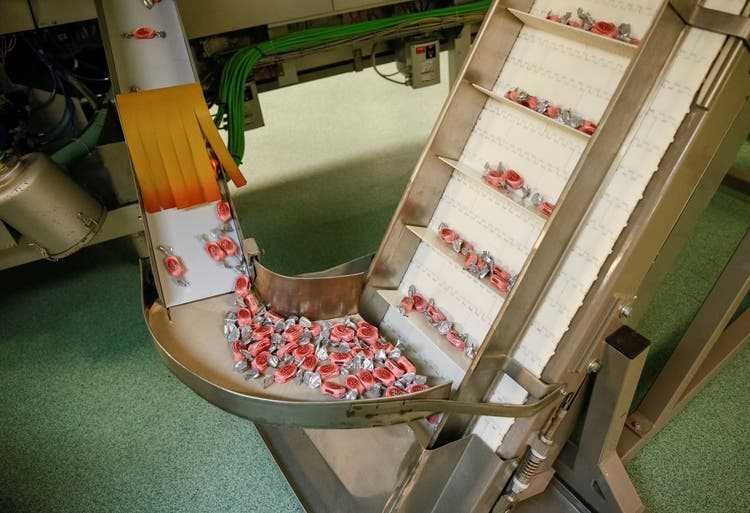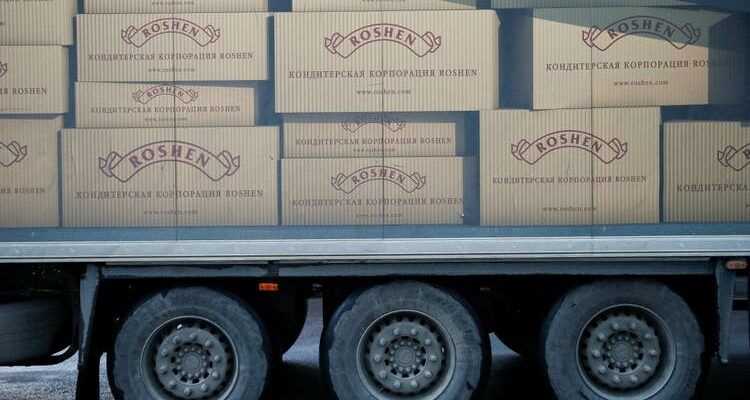Former President of Ukraine Petro Poroshenko is today not only one of the opposition’s greatest financial supporters, but also an important entrepreneur. The heart of his confectionery group Roshen are three chocolate factories. Now Poroshenko claims that he is being persecuted not only as a politician but also as a businessman.
A truck leaves the Roshen confectionery factory in Winnitsa, Ukraine.
In Ukraine, eight years after the pro-Western Maidan, the revolution threatens to devour its children. Just at Christmas, a Kiev district court issued an arrest warrant for the former President Petro Poroshenko at the request of the Public Prosecutor’s Office. The politician, who has been on a trip abroad in the EU for ten days, was shortly before the prospect of being charged with high treason. Specifically, it is about the import of hard coal from the pro-Russian separatist areas for several state companies controlled by Kiev in 2014 and 2015. According to the prosecutor, Poroshenko supported a “terrorist organization” with the equivalent of around CHF 50 million. This refers to the Russian-backed separatists in Donetsk and Luhansk. If convicted, he faces up to 15 years in prison.

Petro Poroshenko, ex-President of Ukraine.
Poroshenko sees himself as a victim of a politically motivated judiciary. Ukraine threatened a blackout in winter 2014/15; In addition, the Donbass coal suppliers were also registered as companies in Kiev at that time and paid taxes there. This has nothing in common with the alleged financing of terrorists, but from summer 2014 he was able to liberate and recapture a large part of eastern Ukraine from the pro-Russian separatists, argues Poroshenko during a personal meeting in the Polish capital, Warsaw. “In the first half of January I will return to Ukraine to defend myself and my voters,” says the former head of state militantly.
Victim of a politically motivated judiciary?
Poroshenko determined the fate of Ukraine in the first five years after the pro-Western Maidan revolution. Immediately after the Russian annexation of the Crimean peninsula, the businessman, who was successful as a chocolate producer, won the presidential elections in May 2014 thanks to his managerial qualities. The Ukrainians trusted him to stop the Russian advance in eastern Ukraine. Indeed, Poroshenko did a great job of modernizing the Ukrainian army. On the other hand, his zeal for reforms soon waned, especially in the areas of anti-corruption and the judiciary. First, the civil activists of the Maidan protests, later also members of his presidential party, European Solidarity, turned away from him, disappointed. They accused him of cementing oligarchic rule and of enriching himself on the back of the war victims. Poroshenko himself was confident of victory in the spring of 2019 and convinced that he would be elected for a second term. In the runoff election, however, it became clear that the old politician had no chance against the political novice and young TV comedian Volodimir Selensky, who was supported by the hostile oligarch Ihor Kolomojski.
Since then, Kolomojski has been pestering Poroshenko through his political representation in parliament and the presidential palace. And with his European solidarity, he put himself at the head of the pro-Western opposition just before Yulia Tymoshenko’s Fatherland Party.

Poroshenko is by far the largest employer in the city of Winnitsa, which has a population of 370,000.
Undamaged reputation in the city of his political home
The descent of Poroshenko in the Ukraine could not harm its reputation in the city of his political home city of Winnitsa in central Ukraine. Poroshenko is still considered a benefactor by many residents there, because almost everyone knows someone who works in one of his three modern chocolate factories. Poroshenko’s sweets brand Roshen is by far the largest employer in the city of 370,000. Roshen Plant No. 1 is almost majestically reflected at night in the city river, the Piwdenne Bug (Southern Bug). From here the river meanders lazily into the Black Sea for around 800 kilometers, and it is just as far to the front line in the Donbass. There is hardly any sign of war in Vinnitsa, the capital of the agricultural area of the same name (Ukrainian: Oblast). “Oh, we have long since got used to the threat from Russia,” says an official in the town hall.
And so Winnitsa in the Ukraine is primarily a Mecca for those with a sweet tooth. This is also due to the many fruit tree and berry plantations in the area. But today the city would be unthinkable without Roshen chocolate. With 10,000 employees, the Roshen Group is also the largest taxpayer in the provincial city. But since Poroshenko is now in the opposition, the town hall likes to emphasize the role of other large investors, such as a firearms manufacturer known throughout Ukraine, a manufacturer of agricultural machinery and an auto parts supplier.
Poroshenko himself also has a split relationship with Winnitsa. From Vinnitsa he was elected to the Verkhovna Rada, the Ukrainian parliament, for the first time in 1998. He will never forget that, so Poroshenko enthuses at the personal meeting in Warsaw. But of course Kiev is more important. The Ukrainian businessman, who grew up near Odessa, bought his first chocolate factory there in 1996, a factory specializing in the production of pralines. He called his confectionery empire, which was in the process of being built, Roshen, derived from his own family name; Poroshenko began expansion in the provincial town of Winnitsa, a three-hour drive west of Kiev, where the building site is much cheaper. There he built two chocolate factories and a condensed milk factory specializing in confectionery.

In 2021, Roshen was ranked 29th among the world’s top 100 confectionery companies – behind Lindt (8th) and Nestlé (6th).
Up until the Maidan Revolution of 2013/14, Poroshenko made around 40% of its sales with Russia. During the Maidan, however, the then Minister of Economic Affairs turned away from pro-Russian President Viktor Yanukovych, took an active part in the pro-Western revolution himself from December 2013 and was elected as his successor in May 2014 after Yanukovych fled to Russia. Moscow subsequently withdrew the necessary import permits from Roshen.
In 2021, Roshen was ranked 29th in the world’s 100 leading confectionery companies (candyindustry.com) – behind Frey (19th), Lindt (8th) and Nestlé (6th) – and had sales of the equivalent of € 800 million. $ the largest chocolate producer in Eastern Europe every year. “I bet that we can make better chocolate in certain sectors than the Swiss,” says the company owner Poroshenko at the Warsaw meeting.
The high treason charges against him are “absurd”, that is the amount, so Poroshenko protests in an interview. “This crossed a red line.” His successor Selensky not only installs the state prosecutor’s office, which is dependent on the state president, in dozens of criminal proceedings against him, but also repeatedly instigates the antimonopoly authority against his corporate empire. Poroshenko explains this by saying that Zelensky is convinced that he is the only financial supporter of the opposition.
And so he is not only persecuted as a politician, but also as a businessman. But since he pays taxes honestly and Roshen has an international financial audit, the old means of tax auditing are no longer used. In fact, on the very day of the threatened high treason lawsuit, the antimonopoly authority (amcu.gov.ua) imposed a horrific fine of almost $ 10.4 million for price fixing in 2018–20 in three syrup and glucose factories belonging to the Roshen Group . “Roshen and my other companies, which together provide 20,000 jobs, have donated the equivalent of $ 70 million to the Ukrainian army since the summer of 2014,” says Poroshenko.
Poroshenko’s corporate empire includes not only the confectionery branch, but also armaments companies and even a seed trade; Meanwhile, he claims to have sold the shipyards. “We pay taxes honestly and have crystal clear books,” said Poroshenko. Winnitsa is an important production location for him, but by no means the only one, says the owner of eight chocolate companies, six in Ukraine and one each in Hungary and Lithuania.
Roshen exports its pralines, chocolates, cakes, sweets and biscuits to 55 countries and is the confectionery market leader in Romania, Bulgaria and Lithuania. The best selection outside the capital Kiev, however, should be available in the main branch of the Winnitsa company store on the central Soborna Street. There, the sweet Swiss eye will notice four rayon chocolates in particular, called Bubble Chocolate here and weighing only 80 grams. The honey brittle is missing, instead there is a caramel rayon. And indeed: the brown version tastes almost as good as the Swiss original.
